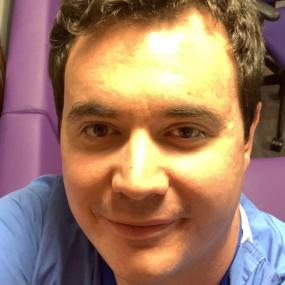Dealing with Dual Training

Colin is a dual ICM/Anaesthetic Trainee in the North East. His interests include Neuro-ICU, Education and Simulation.
You must be mad! The usual response from single CCT colleagues in a now increasing frequency – more exams, more portfolios, longer training, increased cost – all to start on the same pay scale.
‘Why don’t you choose an easier life in X and drop Y’
Some would say that they have a point, but I disagree
Dual training in intensive care, whether your background is in medicine, anaesthetics or emergency medicine, offers a great way to be involved in different aspects of hospital care. It provides the ability to establish networks and strong working relationships with colleagues across each of those specialities – potentially improving the dynamics of the acute care sector of each hospital.
However if you talk to many of the dual trainees around the country – I think that the ideology of above doesn’t always manifest itself during the training programme.
Rather, the reality is that you often feel like you are treading water in each speciality – and sometimes struggling even to do that!
The reasons for this can be many and varied and to include them all would be well outwith the scope of this blog. I have tried to focus on some of the perceived ‘biggest challenges’ (subjective, I appreciate) of dual training and how we can help make our lives easier.
Dual Portfolio
In an ideal world where everyone talks to each other, there would be a central platform where your evidence could be uploaded and you could simultaneously link this to both curriculums.
The lack of crossover means that demonstrating evidence across the curriculums is a very arduous task. That coupled with impending curriculum changes, or previous portfolio switches can lead to a sense of frustration for trainees over the course of a training programme.
Portfolio activities that myself and colleagues have found useful to help make the portfolio aspects less trying towards the end of the year include

Developing a Specialist Interest
One of the downsides of dual training is the lack of specialist skills year in either speciality (this is inbuilt to Anaes/ICM single CCT’s). This means that generating specialist interests may have to occur in your own time or outwith your training programme (Fellowships/OOPE). This can be difficult depending on life circumstances and is not always a viable option to trainees.
If you are aware that you have a particular interest that you wish to develop there are ways of doing so within training.

Increased Length of Training
Dual training will have taken me 9 years in total by the time of completion of training. This is a direct route without deviation and therefore the quickest dual CCT via an Anaesthetic/ICM route. Others will have career breaks, research, children, LTFT and therefore their route to CCT may be significantly longer.
Many of my colleagues who started out on single speciality routes at the same time as me have already gained their CCT. Whilst this is a fantastic achievement for them, I can definitely say that I will benefit from the experience of extra training years. Current work schedules and service provisions have led to safer but ultimately reduced exposure/experience amongst current trainees.
Logbooks
A nice simple, all encompassing logbook would be the dream! Unfortunately there are many different options available to trainees (too many to list).
In order to make my life easier – I use one separate logbook for each speciality, which I never cross populate. Others prefer to have one central logbook.

Dual Exams
Unfortunately – the hurdles have to be jumped. Everyone who has passed has their own anecdotes of the way to get through them. Ultimately you have to do them when it is right in your training and life circumstances.
Exams are hard, and take weeks/months of your life so plan ahead and schedule regular non-exam related fun with friends to take a break.
Entering the final year of dual training, my biggest advice to any trainee would be to try and plan as much of these things in advance. Dual training offers a steep learning/administrative curve but by being organised and efficient you can provide yourself with the time to be successful and the ability to swim with the tide (rather than tread water).
Plans can be moved, but you need to have an idea of what you want to achieve in the first place in order to actually achieve your goal. You can find amazing sources of advice everywhere, (your current hospital, faculty tutors, TPDs and RAs), use them and you’ll find there’s always more than one way to skin a cat!
